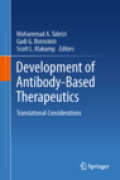
Development of antibody-based therapeutics: translational considerations
Tabrizi, Mohammad A.
Bornstein, Gadi G.
Klakamp, Scott L.
Translational strategies for development of antibody-based therapeutics should allow understanding of the relationship between the ‘unit dose’ and ‘unit effect’ with respect to both beneficial and deleterious effects from early stages of development. The flow of information from later to earlier stages of development should provide opportunities to facilitate selection of more effectivenovel and next-generation drug candidates. Selection and evaluation of relevant biomarkers in early preclinical development in 'relevant' animal models should allow for identifying potential risks to humans and establishing safe First-In-Human (FIH) dosing strategies. Hence, integration of knowledge with respect to target antigen properties such as antigen distribution, expression profile, kinetic properties, target pharmacology, antigen isoforms and pharmacological redundancy in health and disease, as well as antibody design criteria, such as antibody isotype, affinity, PK/PD and safety is a critical necessity for the design of effective translational strategies. Additionally, these factors will further offer critical differentiating characteristics for next-generation antibodies, and novel technologies prove instrumental in generation of biosuperior antibody candidates for market entry. This book will examine many important considerations necessary for the design of effective translational strategies during the development of antibody-based therapeutics. Examines important considerations necessary for the design of effective translational strategies during the development of antibody-based therapeutics. Improves the understanding of generation and engineering of human antibodies. Discusses strategies for development of novel therapies. INDICE: Translational Considerations: Overview. Discovery Process for Antibody-based Therapeutics. Technologies For Generation of Human Antibodies. Application of Antibody Engineering In Development of Next Generation Antibody-Based Therapeutics. Biophysical Considerations For Development of Antibody-Based Therapeutics. Considerations in Establishing Affinity Design Goals for Development of Antibody-Based Therapeutics. Bioanalytical Considerations For Development of Antibody-Based Therapeutics: PK & Immunogenicity. Preclinical Considerations - Oncology. Factors Impacting the Tumor Localization and Distribution ofAntibody-based Therapeutics in Oncology. Preclinical Safety Considerations For Development of Antibody-Based Therapeutics. Application of PK/PD In Development of Antibody-Based Therapeutics. Application Of Population PK-PD In The Design of Translational Strategies For Development of ABTs. Translational Biomarkers: Essential Tools in Development of Antibody-Based Therapeutics. Translational Biomarkers for Development of Antibody-Based Therapeutics in Brain Disorders. Translational Strategies For Development of Novel Therapies For Treatment of Immune Thrombocytopenia (ITP). Application of Bioinformatics Principles ForTarget Evaluation. Considerations in Manufacturing of Antibody-Based Therapeutics. The Bio-Superior Challenge: Strategies for Development of Highly Tailored Monoclonal Antibodies. Concluding Remarks.
- ISBN: 978-1-4419-5953-9
- Editorial: Springer New York
- Encuadernacion: Cartoné
- Páginas: 550
- Fecha Publicación: 12/11/2011
- Nº Volúmenes: 1
- Idioma: Inglés
